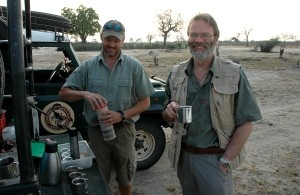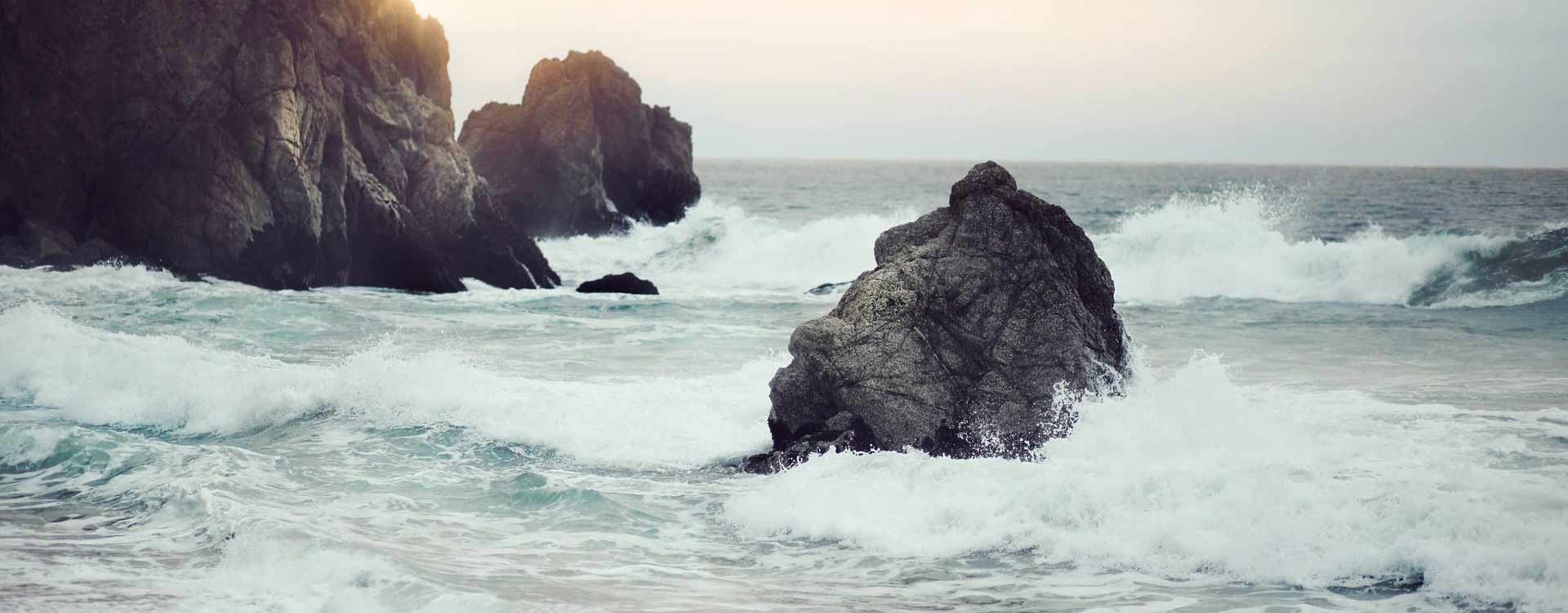
The Silver Lining of Cecil the Lion

About This Project
The Silver Lining of Cecil The Lion
by Heather McElhatton
8/1/15 – Heather McElhatton, host of Minnesota Public Radio program: “A Beautiful World” speaks with Professor David MacDonald, Director of the WildCRU research team at Oxford University.
Interview Transcript
Heather McElhatton: Professor David MacDonald is director of the Wildlife Conservation Research Unit (WildCRU) at the University of Oxford in the UK. His team found their research thrust into the international limelight last week after one of the lions they were studying named Cecil was brutally slaughtered by an American trophy hunter from Bloomington, Minnesota.
Professor David MacDonald: The backdrop to this story is that there’s a global crisis in wildlife conservation, which effects us all and for lions particularly. It seems their numbers are dwindling throughout the continent. Twenty years ago my friend and colleague, Andy Loveridge, and I set up this project to study lions and their conservation in Hwange National Park in Zimbabwe. It’s a colossal project, it’s one of the biggest efforts ever to understand the problems that lions face and to try and use that science – both natural science, but also social science understanding the impoverished communities that live around the park, so that we can come up with solutions for the benefit wildlife and lions, but also the benefit of the local people.
We’ve relied heavily on wonderful and exciting new technology, this satellite tracking method, where we can fit collars to the lions and follow their movements. Cecil the Lion was one of almost 200 lions that we’ve tracked to piece together details of their lifestyle, to provide us with the evidence that allows us to inform policy to come up with better conservation.
HM: Can you tell me how you first became interested in lions?
DM: Actually, I’m speaking to you from the Wildlife Conservation Research Unit in Oxford and I founded that unit in 1986. Rather excitingly, it was the first university-based conservation research unit in the world, which shows you how the world has changed. Now there are many of them but I’m rather proud to have established the first one.
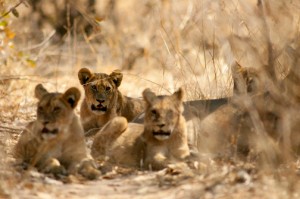 If people are interested in our work, which goes far beyond lions in Zimbabwe and is in fact global, they can visit our website at www.wildcru.org and see us working on everything from lions in Africa to Clouded Leopards in Asia, to Ethiopian Wolves to otters in Peru. Wherever there’s a problem between people and wildlife, the principles are the same. We need to understand the science. We need to understand the interaction between people and wildlife and ask ourselves: how is humanity in the 21st century going to live alongside the wildlife? Wildlife it may treasure, but also depends on for a shared future? Those are the sorts of big global questions that we try to answer in a nitty-gritty way doing challenging work in remote places.
If people are interested in our work, which goes far beyond lions in Zimbabwe and is in fact global, they can visit our website at www.wildcru.org and see us working on everything from lions in Africa to Clouded Leopards in Asia, to Ethiopian Wolves to otters in Peru. Wherever there’s a problem between people and wildlife, the principles are the same. We need to understand the science. We need to understand the interaction between people and wildlife and ask ourselves: how is humanity in the 21st century going to live alongside the wildlife? Wildlife it may treasure, but also depends on for a shared future? Those are the sorts of big global questions that we try to answer in a nitty-gritty way doing challenging work in remote places.
HM: What’s it like to actually be there and working in the field?
DM: Biologists doing this sort of work live an interesting life, because of course like everybody else we have to spend a certain amount of time driving a desk and tapping a computer but for the rest of our time we live sort of outdoorsmen back- woodsman type of lives. I’ve been to Minnesota and it’s a wonderful state and there are a lot of people there who rejoice in the outdoors, so they would not be so unfamiliar with what we do.
In Zimbabwe, working with my close friend and colleague Andy Loveridge, who’s 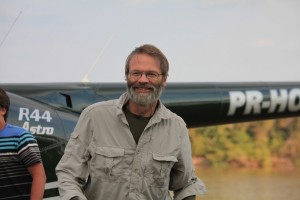 been working alongside me on this project since we started, the sort of day we might have in the field would involve using a four wheel drive vehicle to drive on very muddy rutted roads or off-road altogether to go and try and find a lion to for example answer a question about what it had been doing.
been working alongside me on this project since we started, the sort of day we might have in the field would involve using a four wheel drive vehicle to drive on very muddy rutted roads or off-road altogether to go and try and find a lion to for example answer a question about what it had been doing.
Suppose that overnight the satellite tracking device had told us the Lion had suddenly become stationary. we would normally deduce that it had made a kill, we would be interested in knowing what species of prey it had killed because that would help us understand the details of its lifestyle. So we would then go into the field and we might drive an hour or two in a wilderness situation to find the approximate location where that kill had been made.
The satellites are accurate, but not that accurate so there a needle-in-a-haystack sort of task to find field signs, using the sort of skills back woodsmen would be familiar with – using for tufts of fur on thorns, footprints in the sand, to try and track down where the lions had been. then we’d try to re-construct what happened, find the prey remains, document the age of the prey, what condition it had been in by looking at the marrow in its bones, that sort of thing.
So it’s an interesting and unusual combination between skills that people have used for a millennia living in the wild and skills that depend on using the most cutting edge technology, and we have to try and span those worlds. Its laborious, time-consuming, it’s arduous and its difficult.
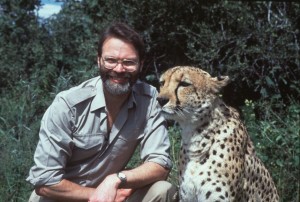 HM: Do you ever take volunteers with you in the field, or is it just staff?
HM: Do you ever take volunteers with you in the field, or is it just staff?
DM: We rarely take volunteers with us, for the reason volunteers rarely have enough time in total and it takes us a long time to train someone in. Also n many of the countries where we work there’s a big bureaucratic burden of getting permissions for each new person that joins the team. So it’s hard for us to take people lightly, as it were. On the other hand, as part of their career development we are approached by biology graduates from around the world and some of them do join us for prolonged periods of time as volunteers on this projects or others around the world.
HM: Did you like animals when you were a child?
DM: (Laughs) Yes, I’m not sure if I’ve ever been good at anything but when I was a little boy I was one of those who was said to love animals and I was good at taming animals and making plaster casts of footprints in the sand. So in some sense this is my natural course through life and I’m so lucky, because the development of the field of conservation is just about as old as I am, so I was able to be in at the beginning and have been able to proudly have some influence in how it unfolded.
HM: Your institution does remarkable work in this field, but you have struggled with finances and keeping your research going. It seems to me Cecil’s death, as tragic as it is, has also greatly increased people’s awareness of the situation and their interest in protecting wildlife.
DM: My heart is bursting with gratitude quite honestly and inspiration. It is of course clear that the start of the story involves an allegedly illegal act and there is personal sadness that a lion we knew a lot about and if I can put it this way, were personal friends with has ended up..has ended up dead , but incredible good is coming out of it and for me perhaps the most important good is the signal that’s going around the world that starts with Cecil, goes onto lions but transcends to wildlife, nature and the environment where millions of people are voicing the thought that they attach value to nature, that they attach value to wildlife and I think this says that humanity at a crucial moment in its history is looking for ways to live alongside nature, both because it treasures it but also because it depends on it. So I think this is a much bigger story than its origins with Cecil the Lion and I think it says something inspirational.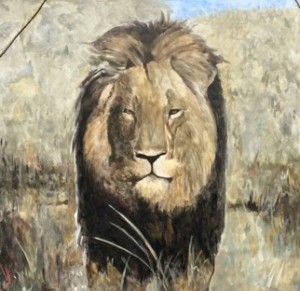
For us, many of these people have amazingly been making donations on wildcru.org, to fund our project, a project by the way that rests entirely on philanthropy. We have no core funding at all. It’s donations that keep us going, and only a few weeks ago we were thinking, Andy Loveridge and myself, sadly that we might have to close down our anti-poaching patrol because we couldn’t afford to pay the salaries. Now that’s been reversed and we’re looking at the possibility of expanding the project and doing better work in a larger area, spanning out of Zimbabwe into Botswana, possibly into Zambia, because of course the lions move oblivious of the national borders throughout this whole landscape, so really there is something quite wonderful coming out of all this and I think it’s a moment in history.
HM: I love how you put it, that your “heart is bursting.” Were you surprised by the global response? I mean you had to shift from your own personal shock at hearing the news and then watch this story grow globally, were you surprised at how seriously people are taking this and how many people are paying attention?
DM: Well, I am surprised. I suppose it’s an aspect of our times, with social media and the internet, that an idea can go viral, but how wonderful that in this case – and let’s move on from the sadness of the origins of it – in this case the topic is something inspirational and truly important to our future.
I want to tell you, if I may, because I know you’re speaking to me from Minnesota and I know Minnesota feels slightly bruised because it has a personal association with this whole episode, that amongst the wonderful people who’ve contacted us are quite a number of Minnesotans and I want to express my gratitude for that. A story I think captures just how remarkable the response has been is that we had an email from someone in Bloomington who said he was concerned that the whole town was tarnished by the illegality of this act and this person, I think his name is Ron Kluft, owns a pizza parlor named “Toppers Pizza” and he’s organizing a fundraising effort, donating profits to lion conservation to demonstrate citizens of Bloomington care about wildlife and nature.
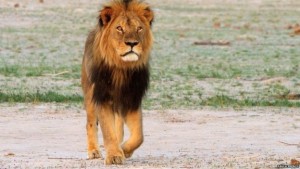 I think it’s quite wonderful that people on the other side of the world are writing to us in Oxford and offering us support with the scientific work we do, work that’s very technical and difficult, to be honest with you, to try and fund solutions to problems that are mind-bendingly complicated. Do not think that because emotion flows freely, that any of these issues are easy. We’re trying to figure out how to get big carnivores to live alongside people in the 21st century. Trophy hunting is just one issue. These lions in Hwange live next to farmland where impoverished farmers struggle to wrest a living out of the land and the lions will kill their cattle. We’re working with these people to try and find solutions for them. One of the solutions we’ve come up with recently has already cut cattle losses to predators by over 80%. So we’re delivering really down-to-earth practical stuff.
I think it’s quite wonderful that people on the other side of the world are writing to us in Oxford and offering us support with the scientific work we do, work that’s very technical and difficult, to be honest with you, to try and fund solutions to problems that are mind-bendingly complicated. Do not think that because emotion flows freely, that any of these issues are easy. We’re trying to figure out how to get big carnivores to live alongside people in the 21st century. Trophy hunting is just one issue. These lions in Hwange live next to farmland where impoverished farmers struggle to wrest a living out of the land and the lions will kill their cattle. We’re working with these people to try and find solutions for them. One of the solutions we’ve come up with recently has already cut cattle losses to predators by over 80%. So we’re delivering really down-to-earth practical stuff.
Think of the practicalities of the work we do. A lot of the correspondence we’re getting suggests people imagine we stumble out into a field and watch the lion and it’s all very easy. Actually we work in very remote places where you need robust four-wheel-drive vehicles and it’s hard to find these lions, even with the aid if the tracking devices. Each tracking device we put on a lion costs one-thousand-five-hundred pounds. (approx $3,000) To download the data from the satellite on a license costs us five-hundred pounds per lion, per year. (approx $1,000) So instantly, you can see this is not a cheap enterprise. I draw a parallel with medical practice. Medical people are trying to look after your health, we conservation biologists are trying to look after the environment. The job is no less technical, no less challenging and requires no less money. So people should realize this is tricky work to do and the technology is wonderful, but it’s expensive.
HM: Are you worried Cecil’s bloodline won’t continue?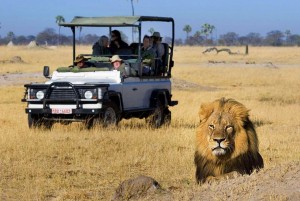
DM: The fact of the matter is, there are quite a few lions in Hwange National Park (approx 500) and what’s more important than worrying about Cecil’s genes, which are probably actually doing fine in his cubs and his relatives, is worrying about the other populations of lions and other big predators and wildlife in general. We have to find a way of protecting them in the future, despite a burgeoning human population and diminishing available land. Our focus now, stimulated by Cecil, must be how to deliver better conservation. So Cecil’s genes will keep going just fine in the lion population. The legacy of Cecil is worldwide to stimulate a forceful conservation.
HM: I understand Cecil’s cubs are still alive and being protected?
DM: Yes, and this is important. People have been concerned by our discovery that the death of a male lion in a coalition can result in their cubs being killed. This is true, this is what we’ve discovered, but it’s not inevitable. In this case, Cecil had a partner in his coalition, another male lion named “Jericho” and Jericho is fit and fine and Cecil’s cubs are fit and fine. There’s a very good chance Jericho will be able to defend the line. He may not and if he can’t, there’s really nothing we can do about it, because this drama unfolds in rugged wilderness, where it’s very hard to intervene at all. But people should take great heart from the fact that Cecil was a mighty and magnificently strong lion, so too is Jericho and there’s a good chance he can hold the line. So far the field team is telling me all is well.
HM: That’s good news and as you said, this is a bigger story, this is about more than just one lion.
DM: There’s a number of remarkable stories here. Let us be clear about what has happened. A professional hunter and a landowner (in Zimbabwe) behaved illegally and I think that’s reprehensible and of course our hearts were broken when Cecil was shot and that sadness turned to anger when we realized it had been done illegally. There was a client involved, a man from your own state (Minnesota) and we simply have no evidence if he was complicit in the illegality or if he was a dupe. The due process of the law will undoubtedly investigate that. Whatever punishment the law might mete out the penalty he’s faced through global vilification must surely be more serious. Justice in a sense has surely already be done. Maybe there’s a moment for some humanity in this.
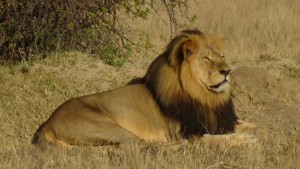 The issue that started with outrage and concern for Cecil, now transcends that in a way that’s a memorial for Cecil, into something much more important than any one lion, or any one of us, or any citizen who behaved badly. Or not. We’re now seeing the world mobilize to express their concern for nature. Cecil becomes a flagship, an emblem for something much bigger. That’s invigorating and gratifying, it leaves us at WildCRU at Oxford humbled and inspired.
The issue that started with outrage and concern for Cecil, now transcends that in a way that’s a memorial for Cecil, into something much more important than any one lion, or any one of us, or any citizen who behaved badly. Or not. We’re now seeing the world mobilize to express their concern for nature. Cecil becomes a flagship, an emblem for something much bigger. That’s invigorating and gratifying, it leaves us at WildCRU at Oxford humbled and inspired.
But I hope another outcome – and this has in a sense been my life’s work – is that a larger number of people will start to understand the complexity of modern-day wildlife conservation. Because this is not easy. This is not a simple juxtaposition of “good guys” and “bad guys.” This is about humanity, with its burgeoning numbers, trying to find a way of protecting wilderness and living alongside animals. These are colossal challenges for our time. They need innovative thinking, they need the very best of technology.
That is what we at the WildCRU in Oxford are seeking to do, but my goodness me, it’s difficult. If more people around the world come to understand that complexity, and come to understand the importance for the entire human enterprise of solving these problems, and this will mean behavioral changes for us all, then I think that will be a colossal historical turning point, stimulated by this unhappy saga.
HM: How can people help you right now?
DM: There’s a wonderful appeal going on, stimulated by Jimmy Kimmel, an American chat show host, who, in an emotional moment, asked his audience to make a donation to us. His voice, in “Leonine terms,” has become a roar. He took the trouble to find out about us, completely unprompted, and he found out about our website. I think he was a wonderful thing he did. Our project is potentially transformed from one where we were living hand to mouth and consi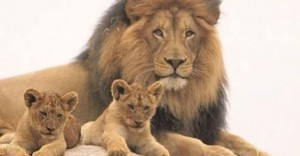 dering shutting aspects of the project down because we couldn’t pay the salaries to one that has become safeguarded at least through the next year and probably beyond.
dering shutting aspects of the project down because we couldn’t pay the salaries to one that has become safeguarded at least through the next year and probably beyond.
If things keep going the way they are, and people continue to donate, then we might be able to expand the project into neighboring Botswana and Zambia, where of course the Lions move across these national borders. So, I would beg people, if they feel motivated to do so, to make a donation at www.wildcru.org. No donation is too small, some of our equipment and salaries and training schemes are of course expensive, but every day we have to put a gallon of petrol in the vehicle so any donation can help us keep the show on the road.
We feel honored to be trusted by people who are perhaps not wealthy, but are making small donations to us which are adding up to colossal sums of money. we are so grateful and I think it’s just marvelous how a story that started with sadness and illegality has transcended that now, and we feel honored by the support.
HM: What have you learned from this incident?
DM: I think I have been re-affirmed in the understanding how complicated, in both biological and human ways, conservation actually is. There was a time when we were pioneers in this field when conservation was about people with beards and binoculars like myself. Today, conservation is about biology, economics, human development, agriculture, the law, international relations…it’s about the politics of humanity. It’s about how society plans to live. We need to change a lot if we are to live alongside nature. The road we’re on is not a promising road, there is a biodiversity crisis. Lions are declining and so too are many other things. So I think what we can learn from this is a re-affirmation of how complicated things actually are.
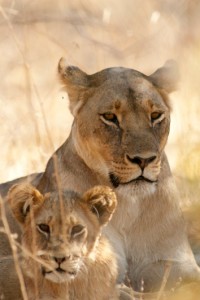 But I also learned on an individual level, about how kindly and motivated people are from all walks of life around the world. I told you about the pizza parlor that’s going to share its profits with us. What an extraordinary thing. There’s also a person who painted a picture outside the dentists house (Cecil’s alleged killer) who’s going to auction it to try and raise money for us. These individual acts by people who I don’t know, I don’t know if they’re big people or small people in terms of their wealth, I imagine they’re everyday people who have been motivated to do something. it brings tears to one’s eyes.
But I also learned on an individual level, about how kindly and motivated people are from all walks of life around the world. I told you about the pizza parlor that’s going to share its profits with us. What an extraordinary thing. There’s also a person who painted a picture outside the dentists house (Cecil’s alleged killer) who’s going to auction it to try and raise money for us. These individual acts by people who I don’t know, I don’t know if they’re big people or small people in terms of their wealth, I imagine they’re everyday people who have been motivated to do something. it brings tears to one’s eyes.
HM: I want to empower people to let them know they can help, and they can get involved, and that sadness is an element of this story, but it’s not the only one. Moving towards change and support, that’s what’s going to transform this story into something beautiful and Cecil will not have died in vain. He’ll have had a heroes life, a heroes journey and a heroes ending, in many ways. Everyone in the world knows who he is and we care. He’s going to catalyze change and awareness and we’ll all be better because of him.
DM: I think you’re absolutely right. I think this is a unique situation and it hasn’t happened before. I think this is a moment of change.
HM: Is there a memorial planned?
DM: I think the memorial is the wave of support, understanding and indeed giving that’s going on around the world. The memorial will be the work that we will do, none of it easy, to try and improve conservation for these lions. Also more broadly, as I mentioned the WildCRU and people like us work around the world on sometimes creatures as majestic as lions, and sometimes creatures that are tiny and creeping and slithering and far from majestic, but which all have a role to play in the ecosystem we depend and in which we may rejoice. I think that’s where the memorial lies and I think we should move away from the sadness of the individual case.
HM: What will you miss about Cecil? You said he was like a friend, what will you miss about him?
DM: Cecil was a particularly magnificent lion. He was quite accessible, because his home range was in a relatively open area of the park, so he was easy to watch. I suppose what one would miss on a personal level, is the next time I’m in Zimbabwe – my colleague Andy Loveridge is there right now ensuring the field team is working at full capacity – but the next time I’m there it’ll be a sadness to me that’ll I’ll go to a place where I have wonderful memories of watching this individual and he won’t be there.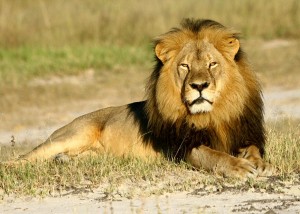
But his partner, Jericho might be there, his family might be there in one form or another, and the soap opera that is the story of lion personal life will have moved on and it will still be something in which to take joy and rejoice and be fascinated.
HM: Professor MacDonald, thank you so much for talking with me today. I’m so sorry for your loss and so excited to see what good may come out of it. I only have one last question for you. I told you the name of our show is “A Beautiful World,” so what does a beautiful world mean to you?
DM: My idea of a beautiful world is actually very futuristic. It is a world in which we have discovered enough about wildlife and the environment and ourselves to use technology to its fullest extent. To create circumstances where we humans live globally at a high standard, with less inequality and less poverty and we do so, alongside a wilderness which not only will be supporting us through ecosystem services, but will also allow us to value and be thrilled by the wildlife that populates that wilderness. So my ideal world involves colossal societal change, but societal change that will be necessary if humanity is to survive the 21st century and live alongside nature.
HM: That was professor David MacDonald, Director of the Wildlife Conservation Research Unit at the University of Oxford. You can find out more about his work on his website at www.wildcru.org. There you’ll find loads of information on the many projects being developed globally and how you can get involved and become a part of the solution. I’m Heather McElhatton and this is A Beautiful World.
A Shorter Interview about Cecil:
External Links:
WildCRU Website: http://wildcru.org/news/cecil-wider-significance/
Listen online: https://soundcloud.com/abeautifulworld/cecil-the-lion-macdonald
ABW Website: www.mpr.org/abeautifulworld


